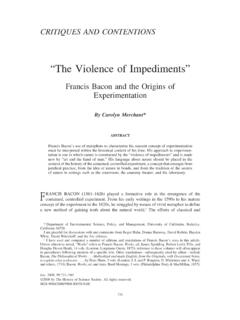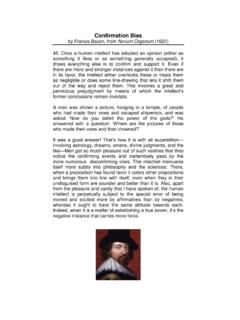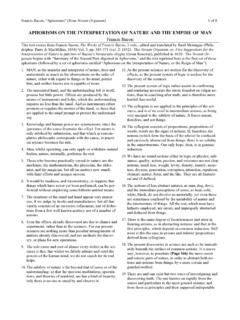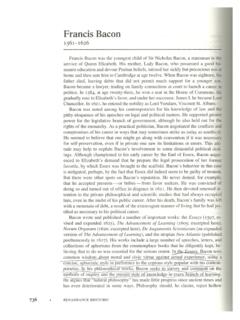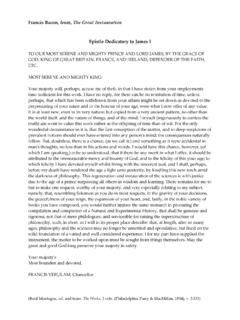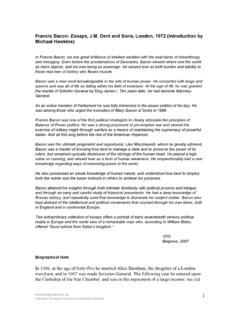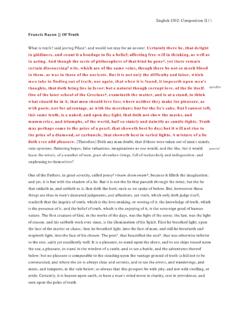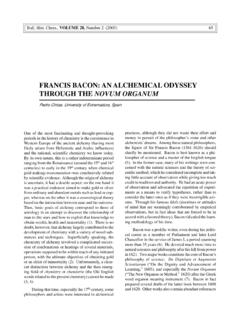Transcription of Lecture 20 Bacon on Interpretation of Nature and Idols
1 Lecture 20 Bacon on Interpretation of Nature and IdolsPatrick MaherScientific Thought IFall 2009 IntroductionFrancis Bacon : 1561 1626 Lord Chancellor of his spare time he worked on a grand plan for Organum:Book by Bacon published in 1620. It describes a new scientificmethod. Written in translation of title:The New Organon. Organon is a Greek word meaning instrument. Aristotle swritings on logic and scientific method were called theorganon. So the title indicates that this is intended to replaceAristotle s writings on logic and scientific Organumconsists of a series of numbered statementsthat Bacon calls aphorisms, divided into two books.
2 Today we ll discuss part of Book of natureThe two waysThere are and can be only two ways of searching into anddiscovering one flies from the senses and particulars tothe most general axioms,and from these principles, the truth ofwhich it takes for settled and immovable, proceeds to judgmentand to the discovery of middle this way is now other derives axioms from the senses and particulars,rising by a gradual and unbroken ascent, so that it arrives at themost general axioms last of is the true way, but as yetuntried.[19]senses and particularsmost general axiomsmiddle axiomssenses and particularsmiddle axiomsmost general axiomsExisting method doesn t make sufficient use of experienceBoth ways set out from the senses and particulars, and rest inthe highest generalities; but the difference between them the one just glances at experiment and particularsin passing,the other dwells duly and orderly among , again, begins at once by establishing certain abstract anduseless generalities,the other rises by gradual steps to thatwhich is prior and better known in the order of Nature .
3 [22]The axioms now in use, having been suggested by .. a fewparticulars of most general occurrence, are made for the mostpart just large enough to fit and take these in;and therefore itis no wonder if they do not lead to new ifsome opposite instance, not observed or not known before,chance to come in the way, the axiom is rescued andpreserved by some frivolous distinction;whereas the truercourse would be to correct the axiom itself.[25]TerminologyThe conclusions of human reason as ordinarily applied in mattersof Nature , I call for the sake of distinction Anticipations of Nature (as a thing rash or premature).
4 That reason which is elicited fromfacts by a just and methodical process, I call Interpretation ofNature.[26]senses and particularsmost general axiomsmiddle axiomsAnticipation of Naturesenses and particularsmiddle axiomsmost general axiomsInterpretation of NatureIdolsIntroductionBacon talks of what he calls Idols that are in the humanmind and interfere with discovering truth. Idol here meansan appearance that doesn t correspond to purpose of discussing them is that, if we know what theyare, we can be on our guard against Idols and false notions which are now in possession of thehuman understanding, and have taken deep root therein, notonly so beset men s minds that truth can hardly find entrance,but even after entrance is obtained, they will again.
5 Meetand trouble us,unless men being forewarned of the dangerfortify themselves as far as may be against their assaults.[38] Bacon divides the Idols into four of the tribeThe Idols of the Tribe have their foundation in human Nature itself,and in the tribe or race of men.[41]ExampleThe human understanding is of its own Nature prone to supposethe existence of more order and regularity in the world than though there be many things in Nature which aresingular and unmatched, yet it devises for them parallels andconjugates and relatives which do not the fiction thatall celestial bodies move in perfect circles.
6 [45]Another exampleThe human understanding when it has once adopted an opinion(either as being the received opinion or as being agreeable toitself) draws all things else to support and agree with there be a greater number and weight of instances to befound on the other side, yet these it either neglects and despises,or else by some distinction sets aside and rejects, in order that bythis great and pernicious predetermination the authority of itsformer conclusions may remain therefore it was agood answer that was made by one who, when they showed himhanging in a temple a picture of those who had paid their vows ashaving escaped shipwreck, and would have him say whether he didnot now acknowledge the power of the gods Aye, asked heagain.
7 But where are they painted that were drowned after theirvows? [46] Idols of the caveThe Idols of the Cave are the Idols of the individual (besides the errors common to human Nature in general)has a cave or den of his own, which refracts and discolors the lightof Nature , owing either to his own proper and peculiar Nature ; or tohis education and conversation with others.[42]ExampleMen become attached to certain particular sciences andspeculations, either because they fancy themselves the authors andinventors thereof, or because they have bestowed the greatest painsupon them and become most habituated to men of thiskind, if they betake themselves to philosophy and contemplation ofa general character, distort and color them in obedience to theirformer fancies;a thing especially to be noticed in Aristotle, whomade his natural philosophy a mere bond servant to his logic,thereby rendering it contentious and well-nigh useless.
8 [54]Another exampleThere are found some minds given to an extreme admiration ofantiquity, others to an extreme love and appetite for novelty;butfew so duly tempered that they can hold the mean, neither carpingat what has been well laid down by the ancients, nor despisingwhat is well introduced by the moderns.[56] Idols of the market placeThese are Idols due to for the name: Words are used for interaction betweenpeople, which occurs in the market place.(Cf. aphorism 43)Example[60]Names of things which do not exist (for as there are thingsleft unnamed through lack of observation, so likewise arethere names which result from fantastic suppositions and towhich nothing in reality corresponds).
9 Of [this] kind are Fortune,the Prime Mover,Planetary Orbits,Element of Fire,and like fictions which owe their origin tofalse and idle example[60]Names of things which exist, but yet confused and ill-defined,and hastily and irregularly derived from realities .. [This]class .. springs out of a faulty and unskillful us take for example such a word as humidand see how farthe several things which the word is used to signify agree witheach other,and we shall find the word humidto be nothingelse than a mark loosely and confusedly applied to denote avariety of actions which will not bear to be reduced to anyconstant of the theaterLastly, there are Idols which have immigrated into men s mindsfrom the various dogmas of philosophies, and also from wrong lawsof I call Idols of the Theater, because in myjudgment all the received systems are but so many stage plays.
10 Representing worlds of their own creation after an unreal and scenicfashion.[44]ExampleThe Rational School of philosophers snatches from experiencea variety of common instances, neither duly ascertained nordiligently examined and weighed, and leaves all the rest tomeditation and agitation of wit.[62]The most conspicuous example of [this] was Aristotle.[63]Another exampleThere is also another class of philosophers [the EmpiricalSchool] who, having bestowed much diligent and careful laboron a few experiments, have thence made bold to educe andconstruct systems, wresting all other facts in a strange fashionto conformity therewith.
